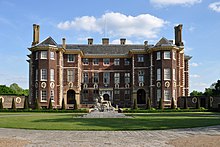| SirThomas Vavasour | |
|---|---|
 Ham House, London Ham House, London | |
| Member of Parliament for Wootton Bassett | |
| In office 1584–1586 | |
| Member of Parliament for Wootton Bassett | |
| In office 1586–1589 | |
| Member of Parliament for Malmesbury | |
| In office 1589–1589 | |
| Personal details | |
| Born | 1560 Yorkshire, England |
| Died | 1620 (aged 59–60) |
| Spouse | Mary Dodge |
| Children | 4 sons, 2 daughters |
| Residence | Ham House (1610–1620) |
| Alma mater | Caius College, Cambridge |
| Occupation | Knight Marshal |
| Military service | |
| Years of service | 1584–1591 |
| Rank | Captain |
| Battles/wars | Arnhem 1585, Netherlands 1587 |
Thomas Vavasour (1560–1620) was an English soldier, courtier and Member of Parliament.
He came from a family long established in Yorkshire. His grandfather was William Vavasour and his father was Henry Vavasour (died 1584) of Copmanthorpe, Yorkshire. His mother, Margaret, was the daughter of Sir Henry Knyvet (died 1547) of Charlton, Wiltshire. Thomas was educated at Eton and Caius College, Cambridge, where he was a fellow commoner.
In 1576 he married Mary, daughter and heiress of John Dodge of Copes, Suffolk, widow of Peter Houghton, alderman of London. They had four sons and two daughters.
He became involved in court scandal and rivalry through the actions of his elder sister, Anne.
He was Member of Elizabethan Parliaments for Wootton Bassett in the 1584 and 1586 parliaments, and member for Malmesbury in the 1589 parliament.
In August 1585 he fought in the Netherlands as captain of foot from Yorkshire, retaining this command until 1591. He distinguished himself on two occasions, once in an attack on a sconce near Arnhem in October 1585, and again in 1587 with Lord Willoughby to fight the Marques del Guasto.
He is thought to have been knighted before August 1595, though the record is unclear.
Following military service he was a gentleman pensioner until the death of the Queen at Richmond Palace in March 1603. Following the accession of James I, Vavasour was made Butler of the port of London, earning him £1,000 compensation. In 1604 he was appointed Knight Marshal of the Household, a role confirmed to him for life in 1612 but, according to John Chamberlain, he sold the right for £3,000, in 1618, two years before his death.
He returned to parliament in 1609 to represent Boroughbridge after the death in office of Sir John Ferne and was re-elected in 1614 to represent Horsham.
In October 1618 he sold the office of Knight Marshall to Sir Edward Zouch for £3000.
Vavasour's wealth and connection to the court allowed the construction of Ham House in 1610 on land belonging to the Crown. After his death in 1620 the lease passed to John Ramsay, 1st Earl of Holderness, a favourite of the King.
References
- Norman Egbert McClure, Letters of John Chamberlain, vol. 2 (Philadelphia, 1939), p. 173.
- Bindoff, S. T. (1981). "VAVASOUR, Thomas (1560–1620), of Skellingthorpe, Lincs. and Ham, Surr.". In Hasler, P.W. (ed.). The History of Parliament: the House of Commons 1558–1603. TSO. ISBN 9780118875011.
| Parliament of England | ||
|---|---|---|
| Preceded byHenry Knyvet Edmund Dunch |
Member of Parliament for Wootton Bassett 1584–1589 With: John Hungerford |
Succeeded bySir Henry Knyvet John Hungerford |
| Preceded bySir Henry Knyvet Henry Bayly |
Member of Parliament for Malmesbury 1589 With: Henry Bayly |
Succeeded bySir Henry Knyvet Thomas Lake |
| Preceded bySir John Ferne Henry Jenkins |
Member of Parliament for Boroughbridge 1609–1614 With: Henry Jenkins |
Succeeded bySir Ferdinando Fairfax George Marshall |
| Preceded byJohn Doddridge Sir Michael Hicks |
Member of Parliament for Horsham 1614 With: John Middleton |
Succeeded byThomas Cornwallis John Middleton |
This article about a 16th-century Member of the Parliament of England is a stub. You can help Misplaced Pages by expanding it. |
This article about a 17th-century Member of the Parliament of England (up to 1707) is a stub. You can help Misplaced Pages by expanding it. |